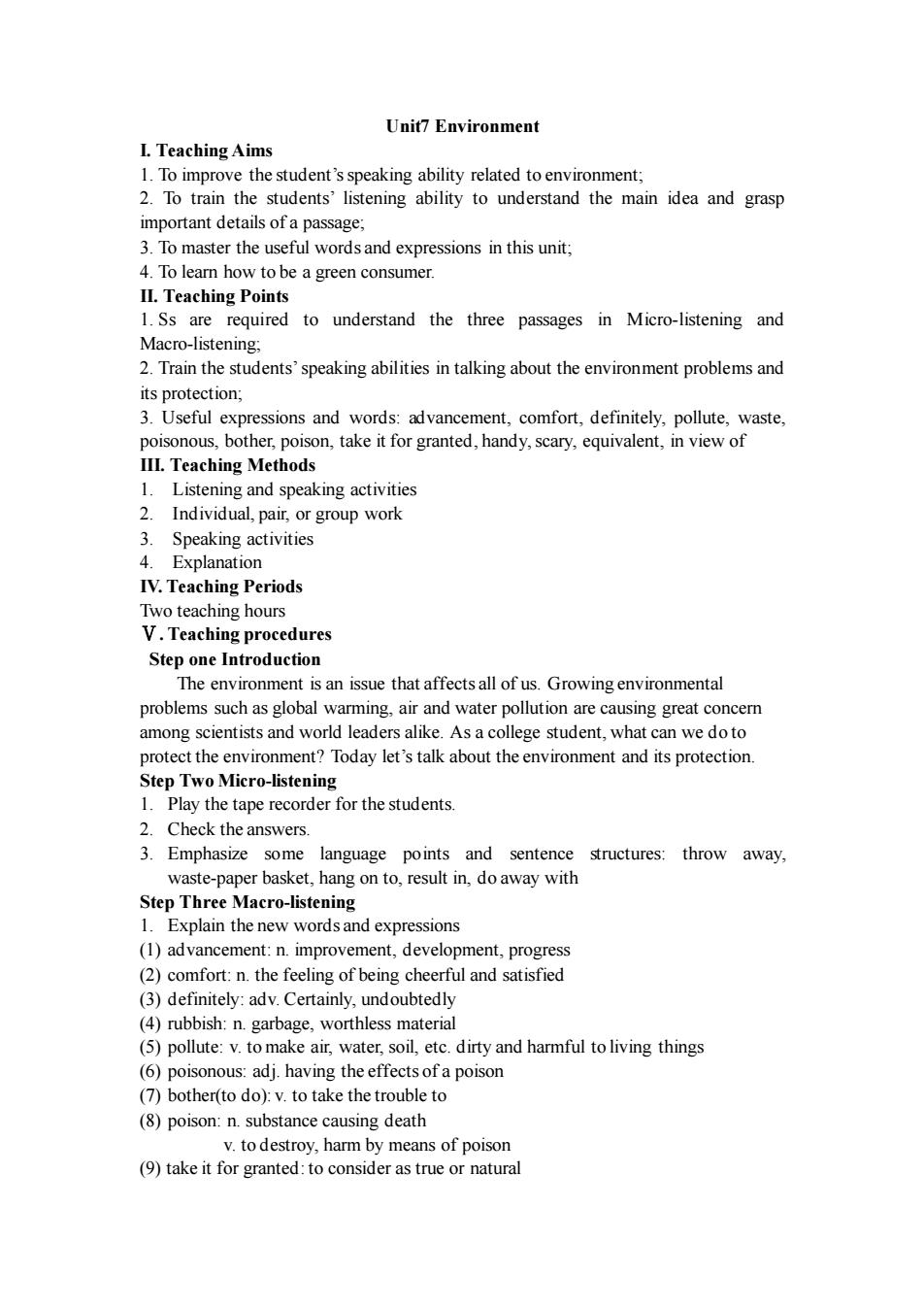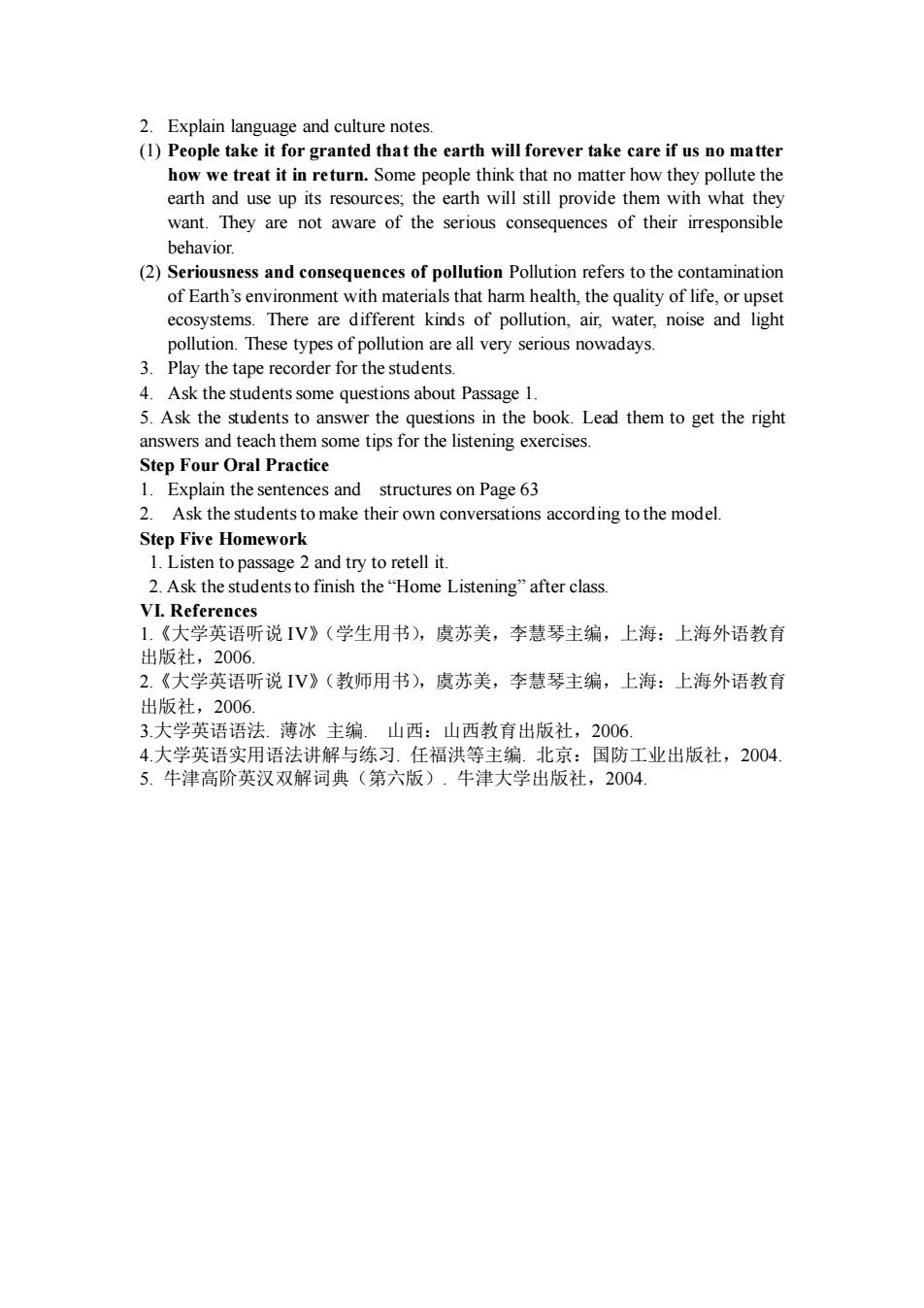
Unit7 Environment LTeaching Aims To improve the student's speaking ability related toenvironment: 2.To train the students'listening ability to understand the main idea and grasp important details of a passage: 3.To master the useful words and expressions in this unit 4 To leam how to be a green consume II.Teaching Point 1.Ss are required to understand the three passages in Micro-listening and Macro-listening: 2.Train the students'speaking abilities in talking about the environment problems and its protection; 3.Useful exp essions and dvancement,comfor,definitely,pole,waste III.Teaching Methods 1.Listening and speaking activities 2.Individual,pair,or group work Speaking ctivities 4 Explanati IV.Teaching Periods Iwo teaching hours V.Teaching procedures is an issue that affects all of us.Growing environmental problems such as global warming,air and water pollution are causing great concemn among scientists and world leaders alike.As a college student,what can we do to protect the environment?Today let's talk about the environment and its protection. Step Two Micro-listening Play the tape recorde for the students. 2. Check the answers 3.Emphasize some language points and sentence structures:throw away. waste-paper basket,hang on to,result in,do away with Step Three Macro-listening 1.Explain the new words and expressions (1)advancement:n.improvement,development,progres (2)comfort:n.the feeling of being cheerful and satisfied (3)definitely:adv.Certainly,undoubtedly (4)rubbish:n.garbage,worthless material (5)pollute:v.to make air,water,soil,etc.dirty and harmful to living things (6) adj having the (8)poison:n.substance causing death v.to destroy,harm by means of poison (9)take it for granted:to consider as true or natural
Unit7 Environment I. Teaching Aims 1. To improve the student’s speaking ability related to environment; 2. To train the students’ listening ability to understand the main idea and grasp important details of a passage; 3. To master the useful words and expressions in this unit; 4. To learn how to be a green consumer. II. Teaching Points 1. Ss are required to understand the three passages in Micro-listening and Macro-listening; 2. Train the students’ speaking abilities in talking about the environment problems and its protection; 3. Useful expressions and words: advancement, comfort, definitely, pollute, waste, poisonous, bother, poison, take it for granted, handy, scary, equivalent, in view of III. Teaching Methods 1. Listening and speaking activities 2. Individual, pair, or group work 3. Speaking activities 4. Explanation IV. Teaching Periods Two teaching hours Ⅴ. Teaching procedures Step one Introduction The environment is an issue that affects all of us. Growing environmental problems such as global warming, air and water pollution are causing great concern among scientists and world leaders alike. As a college student, what can we do to protect the environment? Today let’s talk about the environment and its protection. Step Two Micro-listening 1. Play the tape recorder for the students. 2. Check the answers. 3. Emphasize some language points and sentence structures: throw away, waste-paper basket, hang on to, result in, do away with Step Three Macro-listening 1. Explain the new words and expressions (1) advancement: n. improvement, development, progress (2) comfort: n. the feeling of being cheerful and satisfied (3) definitely: adv. Certainly, undoubtedly (4) rubbish: n. garbage, worthless material (5) pollute: v. to make air, water, soil, etc. dirty and harmful to living things (6) poisonous: adj. having the effects of a poison (7) bother(to do): v. to take the trouble to (8) poison: n. substance causing death v. to destroy, harm by means of poison (9) take it for granted: to consider as true or natural

2.Explain langua e and culture notes (1People take t or granted that the earth will forever take care if us no matter how we treat it in return.Some people think that no matter how they pollute the earth and use up its resources,the earth will still provide them with what they want.They are not aware of the serious consequences of their irresponsible behavior of Earth's environment with materials that harm health,the quality of life,or upset ecosystems.There are different kinds of pollution,air,water,noise and light pollution.These types of pollution are all very serious nowadays. 3.Play the tape recorder for the students. 4.Ask the students some questions about Passage 1 5.Ask the students to answer the questions in the book.Lead them to get the right answers and teach them some tips for the listening exercises Step Four Oral Practice 1.Explain the sentences and structures on Page 63 2.Ask the students to make their own conversations according to the model. Step Five Homework Listen to passage 2 and try to retell it. 2.Ask the students to finish the"Home Listening"after class. VI.References 1.《大学英语听说V》(学生用书),虞苏美,李慧琴主编,上海:上海外语教育 出版社,2006. 2.《大学英语听说IV》(教师用书),虞苏美,李慧琴主编,上海:上海外语教育 出版社,2006 3.大学英语语法.薄冰主编.山西:山西教有出版社,2006. 4.大学英语实用语法讲解与练习.任福洪等主编.北京:国防工业出版社,2004 5.牛津高阶英汉双解词典(第六版),牛津大学出版社,2004
2. Explain language and culture notes. (1) People take it for granted that the earth will forever take care if us no matter how we treat it in return. Some people think that no matter how they pollute the earth and use up its resources; the earth will still provide them with what they want. They are not aware of the serious consequences of their irresponsible behavior. (2) Seriousness and consequences of pollution Pollution refers to the contamination of Earth’s environment with materials that harm health, the quality of life, or upset ecosystems. There are different kinds of pollution, air, water, noise and light pollution. These types of pollution are all very serious nowadays. 3. Play the tape recorder for the students. 4. Ask the students some questions about Passage 1. 5. Ask the students to answer the questions in the book. Lead them to get the right answers and teach them some tips for the listening exercises. Step Four Oral Practice 1. Explain the sentences and structures on Page 63 2. Ask the students to make their own conversations according to the model. Step Five Homework 1. Listen to passage 2 and try to retell it. 2. Ask the students to finish the “Home Listening” after class. VI. References 1.《大学英语听说 IV》(学生用书),虞苏美,李慧琴主编,上海:上海外语教育 出版社,2006. 2.《大学英语听说 IV》(教师用书),虞苏美,李慧琴主编,上海:上海外语教育 出版社,2006. 3.大学英语语法. 薄冰 主编. 山西:山西教育出版社,2006. 4.大学英语实用语法讲解与练习. 任福洪等主编. 北京:国防工业出版社,2004. 5. 牛津高阶英汉双解词典(第六版). 牛津大学出版社,2004